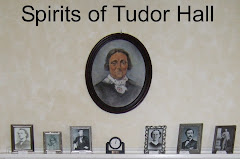The historic Tudor Hall is a fascinating piece of our nation's history. When you visit, you'll connect to the story of the Maryland Booths who left their mark on America forever. You'll walk where they walked, lived, played, worked and dreamed. When you visit, this part of history comes alive.
The property and first floor of Tudor Hall will be open to visitors for tours and talks in 2026 at 1:00 & 2:00 PM on the dates listed below. This year all general tours will be at 1:00 PM. The special talks will be at 2:00 PM.
April 12 & 26; May 3 & 17 & 31; June 14 & 28; July 12 & 26; August 9 & 23; September 6 & 20; October 4 & 18; November 1
Tudor Hall is
located at:
17 Tudor Lane,
Bel Air, MD 21015
The cost of each
Special Talk and each regular tour is $5.00 cash for those age 13 and older.
For
more information:
443-619-0008 or
SpiritsOfTudorHall@gmail.com
The following are the special talks at 2 PM:
April 12
John Wilkes Booth's Sister Asia and Her Children
by Lisa Samia
April 26
Confronting Bad History – Did John Wilkes Booth Escape Justice?
by Francis Gorman
May 3
From Ford's to the Potomac: John Wilkes Booth on the Run
by Jim Garrett
May 17
From the Potomac to Destiny: John Wilkes Booth on the Run
by Jim Garrett
May 31
Lincoln, Shakespeare, and the Brothers Booth
by Michael Anderegg
June 14
Grief, Celebrity, and Redemption: Edwin Booth and the Rebirth of American Theatre
by Elizabeth Reese
June 28
Lincoln's Final Hours
by Kathryn Canavan
July 12
The Weapons of John Wilkes Booth
by Jim Garrett
July 26
John Wilkes Booth on Stage and Screen
by Kate Jones
August 9
Patriarchal Patriot: Richard Booth, father of Junius Brutus Booth
by Kate Jones
August 23
John Wilkes Booth's Sister Asia and Her Children
by Lisa Samia
September 6
The Assassination of President Lincoln and John Wilkes Booth’s Bizarre Second Act
by Francis Gorman
September 20
First Daughter: Rosalie Booth, the Eldest Sister of John Wilkes Booth
by Kate Jones
October 4
Lincoln's Final Hours
by Kathryn Canavan
October 18
Almost Like Being There: A Conversation about Digging Deeper into Primary Sources Surrounding the Lincoln Assassination
by Michael Kauffman
November 1
The Plot to Abduct Lincoln: John Wilkes Booth's First Plot
by Jim Garrett
Below are the speakers for 2026:
Michael Anderegg is professor emeritus of English, University of North Dakota. His books include Lincoln and Shakespeare, Orson Welles, Shakespeare, and Popular Culture and Cinematic Shakespeare.
Kathryn Canavan is an independent researcher and the author of Lincoln’s Final Hours: Conspiracy, Terror, and the Assassination of America’s Greatest President. She started her journalism career as a crime reporter. She eventually worked as reporter or editor in four states and was a National Health Journalism Fellow at USC’s Annenberg School. To get a story, Canavan has reported at gunpoint, lived with the Moonies, negotiated with a killer and joined Tug McGraw in the Phillies dugout.
She began researching the unintended consequences of the Lincoln assassination in 2009. Lincoln's Final Hours has been featured on CSPAN and PBS Newsworks. She explores the effect that one extraordinary night had on the ordinary Washingtonians who witnessed what happened inside Petersen's Boarding House on the night President Lincoln died there. Their eyewitness accounts provide telling new details about the assassination. Some went on to lead lives that are the stuff of novels, and others came to sad ends.
Jim Garrett gets to do what he loves . . . History. He is a lifelong student of history and for the last 10 years plus has shared his love of history with people from around the world. For his entire life, he has been an ardent student of American History concentrating on the Civil War era and the Lincoln Assassination. Beginning in the early 2000's, he was a volunteer at Ford's Theatre, lectured at conferences, including the Department of the Interior, been on radio and co-authored two books and written numerous articles. Now semi-retired, he spends his time with Unscripted Tours of Washington, which is rated the top tour company in Washington by Viatour, the parent company of Tripadvisor. Unscripted Tours is also listed in the top 20 tours in the nation by Viatour as well.





